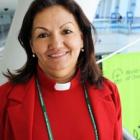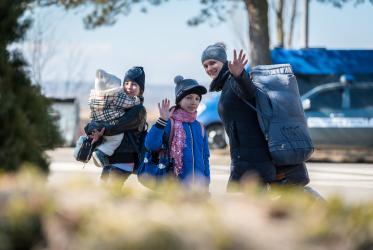The aim of the WCC is to encourage spaces for encounter between the churches in order to give the witness of service to the world in unity with the Spirit of God. During this pilgrimage it has been stimulating to learn of the recognition accorded in Argentina and Chile to the churches and to the organizations that defend human rights.
There has been resounding in our ears the voice of radical activists resisting dictatorships, such as the Mothers of the Plaza de Mayo, the Nobel Peace Laureate Adolfo Pérez Esquivel, the Permanent Assembly for Human Rights in Argentina, and the whole ecumenical movement for human rights in both countries.
The WCC has supported the churches in many ways in the past, from theological biblical studies to the setting up of a publishing house to disseminate worldwide what was happening, support through international organizations, safe houses for those being persecuted, child care, emigration procedures for people under threat, identification of human remains, pastoral care in the search for disappeared children, preservation of memories, etc.
Similarly, we have remained attentive and listened to what people are crying out for at the present time and its challenges, including the following:
Insisting that the trials of those implicated in disappearances and murders be continued, so that their crimes do not remain unpunished; indigenous communities experiencing situations where they need support and encouragement; the need to support to those working with people living on the streets; continuing institutional violence by the security forces in prisons; and repression and torture being used to deal with social protest.
There are common issues which should continue to unite the ecumenical movement in Argentina and Chile, such as the struggle for land, migration, human trafficking, violence against women, and economic and environmental injustice. There is a clamorous demand for protection of the environment, child protection, care for women, and for theological education.
In conversations with our Orthodox brothers and sisters it is imperative to join with them in the struggle to care for their communities in their countries of origin, and to maintain their identity in their adopted land of Argentina.
In our journey with our friends in the Catholic Church there is the recurrent theme of care for the creation and the links to be fostered between the two bodies, based on the persistent calls of the WCC during recent decades, and the prophetic voice of the Pope in the recent Encyclical ‘Laudato Si’.
In conversations with governments an important element has been their acknowledgement of the WCC’s support for the churches and for human rights organizations in periods of dictatorship. Those in power have also listened to the WCC’s voice inviting them to join in our Pilgrimage of Justice and Peace, thus offering their peoples better opportunities for social, economic and gender justice and in care for the created world.
All of these are issues that, in the words of the Rev. Rodolfo Reinich of Buenos Aires, should inspire our gospel-based activities, because "Today it is human beings that are our concern".
In our many meetings and conferences we are reaffirming the call of the WCC 10th Assembly in Busan to the Pilgrimage of Justice and Peace, working to give fresh momentum to the ecumenical movement in Latin America, as a response to the difficult situations we are experiencing in our continent.
We do feel that this call is being heeded and that it will be taken up in the coming decades "so that the world may believe" in the Gospel of Jesus Christ, which still remains relevant today.
Translated from Spanish by the WCC language service. The Spanish version is available on the website of ALC Noticias.





